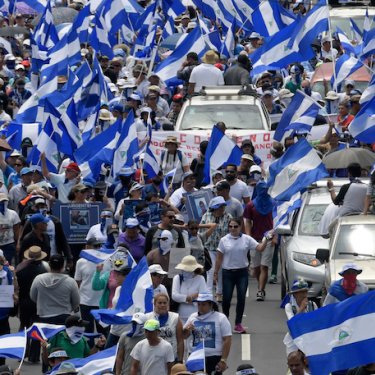Alarming decline in press freedom and free speech in Nicaragua

Reporters Without Borders (RSF) and the Inter American Press Association (IAPA) call on President Daniel Ortega’s government to end the current violence against the media in Nicaragua, to investigate and punish attacks against journalists, and to implement the measures to protect journalists and their families requested by the Inter-American Commission on Human Rights.
These requests were made at a news conference in Managua after a series of meetings with civil society representatives in Nicaragua from 13 to 15 August.
The IAPA and RSF met with media representatives, independent journalists from various provinces, representatives of the Civil Alliance for Justice and Democracy (a coalition of student movements, farmers and business leaders), former President Enrique Bolaños, Catholic Church officials and Managua-based diplomats.
The IAPA and RSF expressed their concern about the systematic and constant campaign of attacks against the independent press by the government led by President Ortega and his wife, Vice-President Rosario Murillo.
The media outlets that the IAPA and RSF delegation met during the visit described the grave level of oppression used by the police and paramilitary groups against the public and journalists during demonstrations.
Journalists and members of the public who are attacked cannot file complaints with the police or judicial authorities because these entities are under political control and lack the autonomy needed to take action.
The attacks on independent media and journalists include threats, persecution, intimidation and smear campaigns, and acts of violence, especially in the provinces. They have included a bomb attack against Radio Darío’s installations and staff in the city of León, and journalist Ángel Eduardo Gahona’s murder in the city of Bluefields.
The IAPA and RSF condemned the government’s use of discriminatory practices in the allocation of state advertising and radio and TV frequencies to strangle media outlets economically; restrictions on the import of journalistic supplies and equipment; abusive tax audits; and the pressure on private sector advertisers to discourage them from placing advertising with independent media outlets.
The IAPA and RSF are alarmed by the degree to which authoritarian policies, propaganda and a secrecy culture have weakened the country’s public institutions, which are no longer trusted by the public and whose representatives refuse any contact with the media.
On the other hand, the two organizations hailed the growing social network presence, which has allowed the public to participate and to keep informed despite the government’s censorship. They also stressed the importance of the solidarity and self-protection procedures developed by the media and journalists, and urged them to extend these practices to their fellow journalists in the provinces.
The IAPA and RSF representatives undertook to send a report of their findings to the working group on the situation in Nicaragua that has been created by the Organization of American States, and undertook to provide Nicaragua’s journalists and media with their handbooks and guides on how best to cover situations involving a high level of risk.
The IAPA and RSF ask President Ortega’s government to:
- Put an immediate stop to all physical attacks, acts of intimidation and threats by parapolice, paramilitary and violent groups that support the government, and by online activists who defame and insult independent journalists on social networks.
- Conduct thorough investigations into all acts of violence against journalists and media outlets and strictly enforce the law against all those responsible, so that impunity does not fuel even more violence.
- Implement the protective measures requested by the Inter-American Commission on Human Rights for journalists who have been attacked or threatened, and for their families; and create a national mechanism for the protection of journalists and a special prosecutor’s office to investigate crimes of violence against journalists, like those that already exist in other Latin American countries.
- Recognize – in line with the Inter-American Democratic Charter and the Chapultepec Declaration (which says press freedom is essential to democracy) – that the government and national and international bodies have an obligation to seek an appropriate and stable framework for a dialogue based on respect and tolerance that opens the way to a democratic solution to Nicaragua’s grave social and political crisis.
The IAPA/RSF international delegation consisted of Gustavo Mohme, IAPA president and publisher of the newspaper La República (Peru); Roberto Rock, the chair of the IAPA's Committee on Freedom of the Press and Information and editor of the news portal La Silla Rota (Mexico); Emmanuel Colombié, the head of RSF’s Latin America bureau (Brazil); and Ricardo Trotti, the IAPA’s executive director (United States).
Nicaragua is ranked 90th out of 180 countries in RSF's 2018 World Press Freedom Index.



